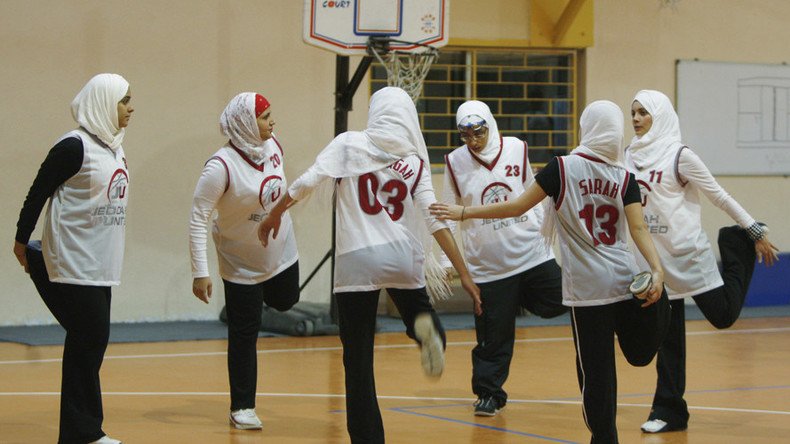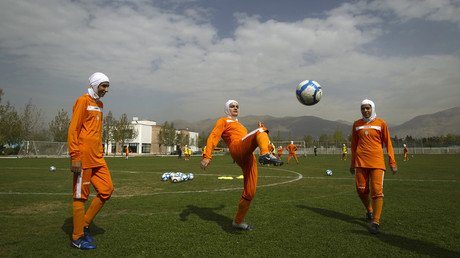FIBA Hijab ruling: Shot in the arm for ‘sexual apartheid’

When the FIBA (International Basketball Federation) altered its rules to allow players to wear religious headgear during games at its Congress on May 4, it administered a shot in the arm for the gender apartheid afflicting women in the world of sport.
Unsurprisingly, the move was heralded by campaigners who had long tried to inculcate in FIBA that their previous rule banning headgear - albeit on safety grounds - was restrictive.
Activist Shireen Ahmed acclaimed the action as bringing a “sense of belonging” to Muslim women in basketball. Darsh Preet Singh, the first Sikh-American to wear a turban in a US college basketball game said he was “thrilled” at the ruling, which he said would allow players “to pursue their dreams without compromising their faith.”
Their voices, along with the ‘FIBA Allow Hijab’ campaign, led by 20-year-old Bosnian-American Indira Kaljo, a pro basketball player and activist, unquestionably precipitated a FIBA reaction to include players unable to take part in professional basketball simply due to their religious practice.
While FIBA’s actions may seem noble, they have done nothing more than buckle under the weight of popular pressure from those who campaign for change that only benefits themselves, shoehorning in newly-implemented legislation which will come into effect as of October 1, 2017, in between rules that are now heavily compromised.
In its statement confirming the changes, the organization seized the chance to obsequiously flaunt its faux pas ‘progressive’ stance by citing “a historical moment that occurred in Iran on April 13, when a FIBA test game featuring women wearing hijabs marked the first time men witnessed a women's sporting event in person."
FIBA justified its stance cozied up to a country guilty of consistent infractions of women’s rights and which bans those who exercise their free will not to wear a hijab, as it has been compulsory for women to wear one since Iran’s Islamic revolution in 1979. FIBA’s rule change was not a victory for freedom; it is only dependent on the condition Iranian women complied with a law imposed on them for generations.
Not wearing the hijab continues to prohibit women from participating in sport, especially in Iran where women have long been subjugated to a government that forces the hijab upon them. In February this year, 19-year-old chess grandmaster Dorsa Derakhshani was banned from competing for the national chess team. Her crime? Choosing not to wear a hijab while competing as an independent player in the 2017 Gibraltar Chess Festival.
Did the incident prick the ears of Singh, Ahmed, and Kaljo, who purport to seek change? No. Simply put, the quiet plight of Derakhshani is not enough like the attractive mob mentality behind the ‘FIBA Allow Hijab’ movement to gain momentum. Although the incident occurred less than three months before FIBA’s rule changes, the federation pleaded ignorance and instead went ahead with their tactless self-glorification that essentially supports the ban on the young grandmaster.
But Derakhshani, who had moved to Barcelona, Spain, to study at the time of her ban, did find strong support from Iranian-Belgian activist Darya Safai, founder of the ‘Let Iranian women enter their stadiums’ campaign - which aims to fight against gender discrimination and return basic rights to Iranian women.
During the Rio 2016 Olympics, Safai carried a flag with the name of her group into the Egypt-Iran volleyball match. Her words were received with something less than dignity: she was ushered away, in tears, from the stadium for violating Olympic rules on bearing political slogans, starved of the oxygen to protest by an organization supposedly upholding the Olympic values but one that instead, like FIBA, reinforced the repugnant sexual apartheid Iranian women suffer.
Safai’s and Derakhshani’s cases are unfortunately not uncommon. Just last month, Iranian futsal player Shiva Amini was dropped from the national team because she played in an exhibition game with men and without a hijab during a tour of Switzerland and Italy. The Iranian Futsal Federation told her she did not have the right to play without the veil even in non-official games abroad.
Basketball governing body rules to allow hijabs during games https://t.co/6lrxuKVwDk
— RT Sport (@rtsportnews) 4 мая 2017 г.
Other examples include a five-year-old Iranian girl denied access to the stadium of Persepolis FC in the Persian league, due to the same ruling Safai protested in Rio. Each case represents a victory for this inequality that organizations like FIBA unwittingly support with embarrassing, ill-informed displays of positive discrimination.
When FIBA chose to champion an event in Iran that broke from the oppressive norm in Iran, they impugned its credibility as an organization intent on progression. FIBA demonstrated no consideration to those who face being villainized, ostracized, and admonished by the country they are proud to represent. Instead, in their statement, they labeled as groundbreaking what was, in fact, grotesque and described as historical what should have been proscribed as archaic.
The voices of Derakhshani and Safai will never be heard with any shred of sincerity while sporting bodies continue to wilt in the face of activists campaigning only for their personal gain, never acknowledging that they are not the only ones being prohibited from participating in the sport they love because of their choice of headgear.
While such actions continue, sexual apartheid will only grow under the guise of good intentions by organizations which know little about a topic they so freely wade into only to cover themselves in glory.
Daniel Armstrong, for RT.
The statements, views and opinions expressed in this column are solely those of the author and do not necessarily represent those of RT.













